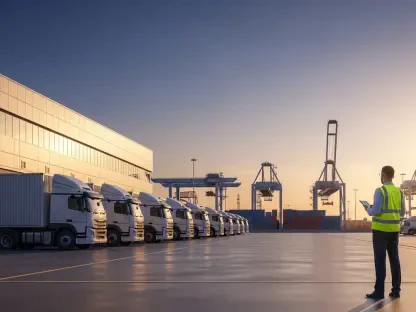In today’s dynamic retail landscape, businesses are grappling with the profound effects of shifting trade policies, particularly the uncertainties tied to tariff adjustments. Retailers have been forced to adapt their strategies to survive the volatile trade climate and rising import costs. This instability has its roots in policies from Donald Trump’s presidency, prompting Vancouver-based retailers to rethink established supply chain models reliant on Asian manufacturers. Companies are now exploring alternative strategies to remain competitive and maintain financial viability. As tariffs continue to reshape the global trade environment, companies find themselves at a crossroads, compelled to innovate and restructure to mitigate financial strain.
Retailers in Vancouver are illustrating a spectrum of responses to these challenges. Oak + Fort is a notable case, recently filing for creditor protection, attributing their financial distress partly to the burden of increased tariffs. Analyst David Ian Gray, however, emphasizes that rapid, unsustainable expansion also played a critical role in their financial woes. Meanwhile, other companies like Duer have managed to insulate themselves from significant tariff impacts by employing a proactive approach, controlling costs effectively and broadening their market reach into the U.S. and Europe. These varied responses underscore the necessity for strategic agility in navigating an ever-changing trade landscape, highlighting how each retailer’s approach reflects distinct challenges and opportunities in adapting to new realities in global commerce.
Adapting to a Shifting Trade Environment
Retailers are exploring a variety of strategies to adapt to the challenges posed by rising tariffs and trade tensions. Aritzia, a major player in Vancouver’s retail scene, recognizes the importance of flexibility and creativity in its approach. To circumvent high tariffs, Aritzia is shifting portions of its production to regions less affected by such trade barriers. This strategic relocation is coupled with efforts to negotiate with suppliers, aiming to absorb cost increases without significantly affecting consumer prices. By optimizing initial markup opportunities, Aritzia plans to tackle rising expenses through comprehensive business cost reductions, not merely through higher consumer prices. This comprehensive approach presents an opportunity to improve efficiency and resilience, ensuring that the company can sustain profitability in today’s turbulent trade climate.
Similarly, Lululemon is reassessing its operations to better withstand the impact of tariffs. Facing considerable pressure from share price drops linked to tariff-induced weak financial guidance, the company is intensifying its focus on cost management and supply chain efficiency. By honing these strategies, Lululemon aims to lower production costs and improve overall operational agility. Moreover, they are revisiting their pricing tactics, inspired by companies like Zara, which has chosen to distribute tariff-induced costs globally to equalize the price impact across different regions. This pragmatic stance emphasizes the importance of reevaluating operational aspects that extend beyond mere pricing adjustments, crafting a more robust response to ever-present trade uncertainties.
Strategic Reinvention and Sustainable Growth
Navigating the turbulent waters of global trade requires an astute balance of short-term adjustments and long-term strategic planning. Retailers understand that enduring these challenges involves more than just tackling immediate obstacles; it requires rethinking their fundamental business practices. Across the industry, there’s a noticeable trend toward increasing operational efficiency—a strategy that not only addresses the direct impacts of tariffs but also positions companies to thrive in the long term. Supplier relationships, for instance, are being leveraged more robustly; engaging suppliers in dialogue and negotiation is emerging as a crucial element in mitigating cost pressures. Production shifts, though complex, offer yet another avenue for retailers to navigate the irrevocably altered landscape of international trade.
These strategic adaptations are not merely reactive measures. They reveal a broader recognition that the shifting trade environment exposes inherent operational inefficiencies that require urgent attention. The evolving retail sector demonstrates a collective embrace of strategic flexibility, making clear that resilience in the face of tariffs extends beyond counteracting external crises. Instead, spaces for innovation and improved practices are being carved out, signifying an overarching movement toward sustainable growth. David Ian Gray’s comments underscore this shift, indicating that many optimization practices should have long been in place but are now receiving the focus they deserve.
Navigating the Path Forward
In today’s ever-changing retail environment, businesses face significant challenges stemming from shifting trade policies, especially the unpredictability of tariff changes. Retailers must adjust their strategies to survive the fluctuating trade climate and the rising costs of imports. These issues began under the policies of Donald Trump’s presidency, leading Vancouver-based retailers to reassess their dependence on Asian manufacturers. Now, companies are exploring new ways to stay competitive and financially viable. As tariffs continue to alter the global trade landscape, businesses are at a critical juncture, compelled to innovate and restructure to ease financial strain.
Retailers in Vancouver are showcasing a range of responses to these obstacles. For instance, Oak + Fort recently sought creditor protection, citing increased tariffs as one reason for their financial troubles. Analyst David Ian Gray, however, pointed to their rapid, unsustainable expansion as a key factor. On the other hand, companies like Duer have effectively shielded themselves from severe tariff impacts by taking a proactive stance—controlling costs and expanding their presence in the U.S. and Europe. These diverse approaches highlight the need for strategic agility in dealing with an unpredictable trade environment, with each retailer facing unique challenges and opportunities as global commerce evolves.









